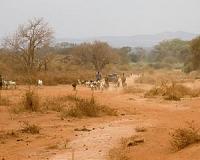 |
Victoria, Canada (SPX) Nov 02, 2010 Industrial-scale aquaculture production magnifies environmental degradation, according to the first global assessment of the effects of marine finfish aquaculture (e.g. salmon, cod, turbot and grouper) released this week. This is true even when farming operations implement the best current marine fish farming practices. Dr. John Volpe and his team at the University of Victoria developed the Global Aquaculture Performance Index (GAPI), an unprecedented system for objectively measuring the environmental performance of fish farming. "Scale is critical," said Dr. Volpe, a marine ecologist. "Over time, the industry has made strides in reducing the environmental impact per ton of fish, but this does not give a complete picture. Large scale farming of salmon, for example, even under even the best current practices creates large scale problems." The fish farming industry is an increasingly important source of seafood, especially as many wild fisheries are in decline. Yet farming of many marine fish species has been criticized as causing ecological damage. For instance, the researchers' found that the relatively new marine finfish aquaculture sector in China and other Asian countries lags in environmental performance. Dr. Volpe added, "The fastest growing sector is Asia, where we found a troubling combination of poor environmental performance and rapidly increasing production." With support from the Lenfest Ocean Program, Dr. Volpe and his team developed GAPI, which uses 10 different criteria to assess and score environmental impacts. Incorporating information such as the application of antibiotics and discharge of water pollutants, GAPI allows researchers to gauge which farmed species and countries of production have the best or worst environmental performance. The researchers examined the environmental impact of marine fish farming per ton of fish produced and the cumulative environmental impact for each country producing a major farmed species. "GAPI provides a valuable tool for developing environmentally responsible fish farming. Governments can use GAPI to inform policies and regulations to minimize the environmental footprint of fish farming. Farmers can use it to improve production practices. And buyers can use it to compare and select better, more environmentally friendly seafood options," said Chris Mann, senior officer and director of the Pew Environment Group's Aquaculture Standards Project, which collaborated on the work. For further information on GAPI, including a summary of the methodology and findings, please visit www.lenfestocean.org. The GAPI 2010 report released here is based on 2007 data, the most recent year for which data for all aquaculture indicators are available. GAPI analysis will be updated periodically as additional data becomes available.
Share This Article With Planet Earth
Related Links Global Aquaculture Performance Index (GAPI) Lenfest Ocean Program Pew Environment Group Farming Today - Suppliers and Technology
 Broadening Market Opportunities For Africian Livestock Farmers
Broadening Market Opportunities For Africian Livestock FarmersAddis Ababa, Ethiopia (SPX) Nov 02, 2010 As agricultural leaders across the globe look for ways to increase investments in agriculture to boost world food production, experts in African livestock farming are meeting in Addis Ababa this week to deliberate on ways to get commercialized farm production, access to markets, innovations, gender issues and pro-poor policies right for Africa's millions of small-scale livestock farmers and herd ... read more |
|
| The content herein, unless otherwise known to be public domain, are Copyright 1995-2010 - SpaceDaily. AFP and UPI Wire Stories are copyright Agence France-Presse and United Press International. ESA Portal Reports are copyright European Space Agency. All NASA sourced material is public domain. Additional copyrights may apply in whole or part to other bona fide parties. Advertising does not imply endorsement,agreement or approval of any opinions, statements or information provided by SpaceDaily on any Web page published or hosted by SpaceDaily. Privacy Statement |